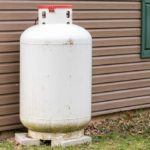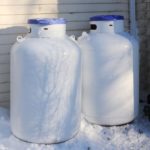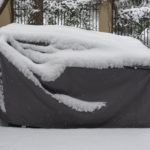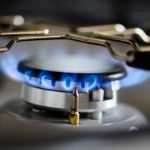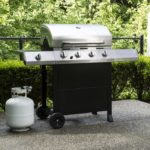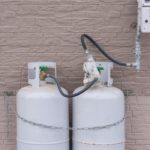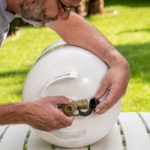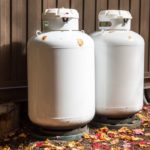As the pleasant autumn breeze gives way to the chilly winter winds, many people wonder where and how they should store their propane tanks. If you only use a propane tank for hosting barbecue parties in the summers, where are you supposed to keep it once winter rolls around?
Make sure you store your propane tank vertically in an open space with good ventilation during winter. You should also disconnect any hoses, and tightly close all valves. Refilling the tank before long-term storage won’t hurt anything, and will ensure you’re prepped for next season!
Let’s look at how cold weather affects propane tanks, whether you can store them outside in the winters, and a few other safety tips, so that you can keep your family and friends as safe as possible.
Does Cold Weather Affect Propane Tanks?
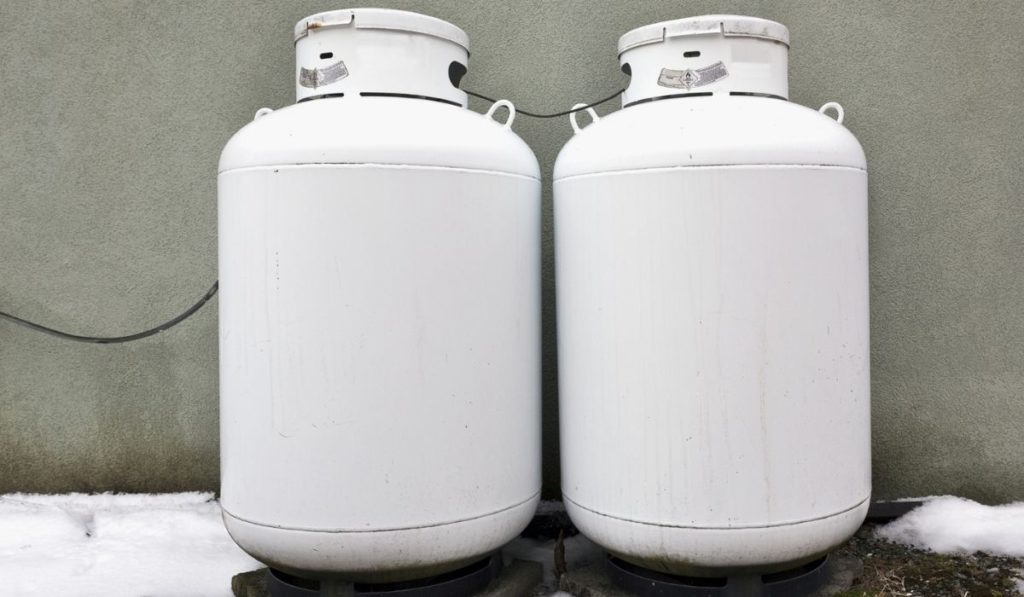
Propane has a freezing point of around -44˚F/˚C. And while it’s highly unlikely that your city will receive such cold temperatures, it’s still important to take the right safety measures when storing a tank during the winter.
Propane contracts in extremely cold temperatures, reducing the pressure in the tank. If the pressure inside the tank becomes too low, the fuel will be unable to reach the gas burner. This means that the tank won’t be able to power your propane appliances, including the boiler, heater, and furnace, potentially leaving you without heat in the dead of winter.
Can You Store Propane Tanks Outside in the Winter?
You should always store a propane tank in an open space that has proper ventilation. Storing a tank indoors is extremely dangerous and can put your property, or even worse, your life at risk. Try to avoid storing the tank in a car, tent, garage, or basement.
You can safely store a propane tank outside in the winter because freezing temperatures aren’t as dangerous as high temperatures. However, you should take a few precautions to protect the tank from the harsh winter elements. Let’s take a look at a few of the most important ones:
Cover the Tank With a Tarp
It’s advisable to use a plastic tarp to cover up the propane tank so that ice and snow do not accumulate on top of the tank. This will also help prevent rusting and extend the life of the tank.
Turn Off All Valves
If you only use the propane tank during the summers for things like barbecues and you store your grill outside, then you don’t need to disconnect the tank. Instead, just make sure that you’ve turned off all the valves.
However, if you store your propane grill indoors, turn off the tank’s valves and disconnect it from your grill.
Check for Leaks
Even if you’ve just bought your propane tank, it’s imperative that you check the tank for any leaks before storing it away. Check the valves, the connector hose, and the tank itself for any leaks or signs of wear and tear.
You can easily identify leaks by rubbing non-abrasive soap on the tank after disconnecting it. Mix the soap with water and spray the mixture around the valves and the connector hose, and on the tank itself.
If you spot any bubbles, then your tank might have a leak. It’s advisable to double-check that you’ve removed all connections and completely shut off all valves before spraying the tank one more time to confirm the leaks.
If the bubbles keep appearing on the tank or the connections, call your propane supplier for instructions on how to properly dispose of the tank.
Other Propane Tank Safety Tips
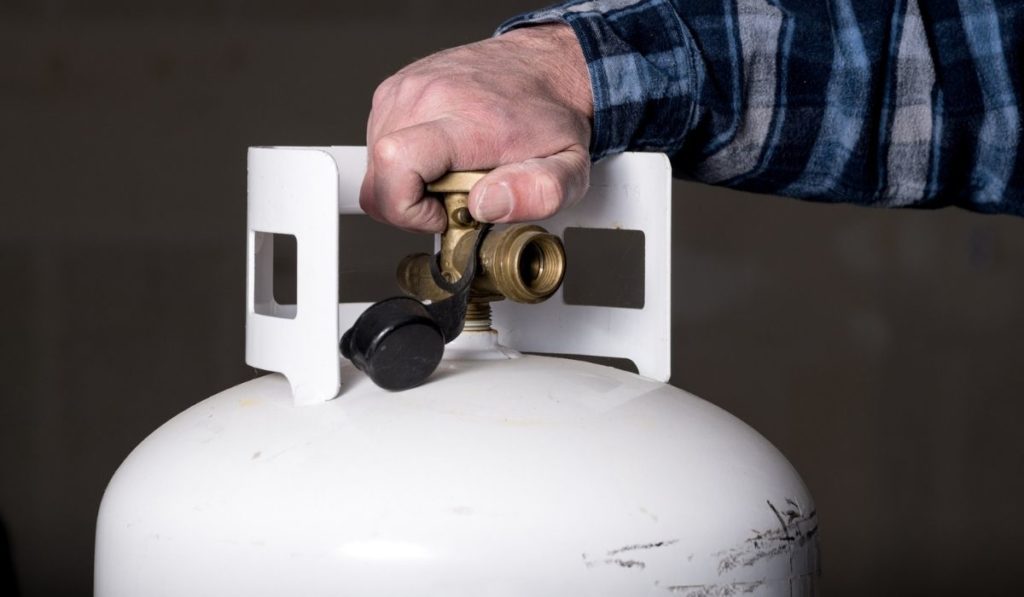
It’s essential to take the right precautions and follow the best safety practices when using and handling propane tanks, appliances, generators, and fuel lines.
Here are a few important safety tips that can help ensure the safety of you and your family at all times:
Handling Tanks and Filling Cylinders
- Hire a professional to fill your propane cylinder, and never try to do it yourself. It’s illegal for a propane supplier to fill an outdated cylinder or to fill more than 80% of the container.
- Make sure you have your cylinder checked and replaced or re-certified every 10 years. You can determine the date at which the cylinder was last qualified by checking its date stamp.
- Closely inspect the tank before storing it. If it’s damaged, rusty, or you’re just unsure about its condition, discard it and purchase a new one to be on the safe side.
- Remember to ask your propane supplier how to properly discard the cylinder, so it can be emptied and recycled properly.
Using a Propane Tank
- Make sure the tank is securely connected to your propane appliances before turning on the valve.
- Keep the propane tank away from building exits and any flammable materials.
- Only use your propane tank with appliances that have been approved for propane.
Storing a Propane Tank
- Keep the propane tank outside, in an upright, vertical position, and on a base that’s fire-proof.
- Tightly close its valve, even if the tank is empty.
- Make sure the valve is protected at all times.
- Before storing, disconnect the hose and cap or plug all outlets.
What to Do if You Smell Gas
- Put out all open flames and remove flammable materials from the path of the fire immediately.
- Evacuate the place where you think there’s gas leakage.
- Close the supply valve of the propane tank if there’s no safety risk.
- Call your propane supplier once you’re in a safe area. If you can’t call them, contact 911.
- Don’t return to the place with the gas leak until your propane retailer, qualified service technician, or an emergency responder confirms that the area is safe.
- Hire a qualified service technician or ask your propane retailer to examine your entire system and ensure it’s leak-free.
Install a Propane Gas Detector
In certain circumstances, you might be unable to detect a gas leak. For this reason, it’s best to install a propane gas detector, like this High Sensitivity Natural Gas Detector (on Amazon). These devices sound an alarm as soon as they detect propane gas in the air.
It’s also a good idea to install more than one propane gas detector, especially if you find it difficult to smell propane, or if your propane appliances are kept in rarely-used spots in the house where the smell of propane might not be as prominent.
Detectors offer an extra level of security. It’s important to purchase a high-quality detector, so make sure you opt for models that are listed and approved by Underwriters Laboratories. It’s also advisable to maintain and install them as recommended by the manufacturer to ensure that they function properly.

